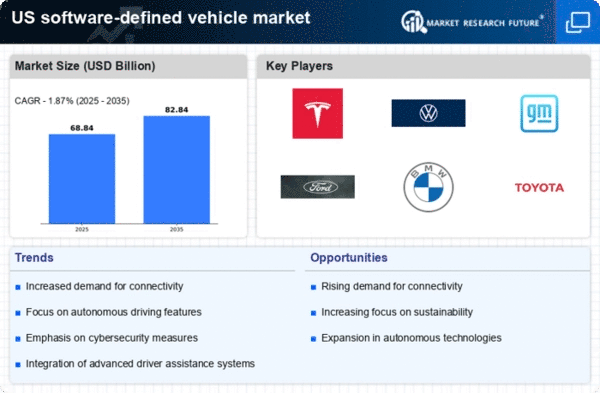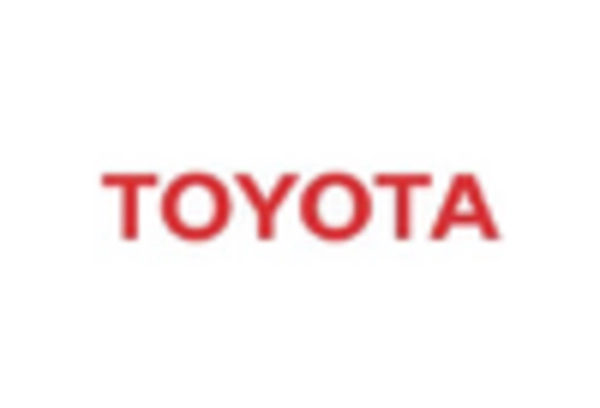Evolving Regulatory Frameworks
The software defined-vehicle market is significantly influenced by evolving regulatory frameworks aimed at enhancing vehicle safety and environmental sustainability. In the US, regulations are increasingly mandating the incorporation of software solutions that monitor emissions and improve fuel efficiency. For instance, the National Highway Traffic Safety Administration (NHTSA) has proposed new guidelines that encourage the adoption of software technologies in vehicles. This regulatory push is expected to drive investment in the software defined-vehicle market, as manufacturers seek to comply with these standards while also meeting consumer demands for greener technologies. The market could see a substantial increase in software-driven innovations as a result.
Consumer Preference for Personalization
The software defined-vehicle market is witnessing a shift in consumer preferences towards personalized vehicle experiences. Modern consumers are increasingly seeking vehicles that can be tailored to their individual needs, from infotainment systems to driving modes. This trend is prompting automakers to invest in software solutions that allow for greater customization. Data indicates that nearly 70% of consumers express interest in vehicles that offer personalized features. As a result, the software defined-vehicle market is likely to expand, as manufacturers develop software platforms that enable these personalized experiences, thereby enhancing customer satisfaction and loyalty.
Technological Advancements in Connectivity
The software defined-vehicle market is being propelled by rapid technological advancements in connectivity. Innovations such as 5G networks are enabling vehicles to communicate with each other and with infrastructure, enhancing safety and efficiency. This connectivity allows for real-time data exchange, which is crucial for the development of autonomous driving technologies. As the infrastructure for 5G continues to roll out across the US, the software defined-vehicle market is expected to benefit significantly. Analysts predict that the integration of advanced connectivity features could lead to a market growth of over 15% by 2026, as vehicles become more integrated into the digital ecosystem.
Increased Investment in Research and Development
The software defined-vehicle market is experiencing a surge in investment in research and development (R&D) as companies strive to innovate and stay competitive. Major automotive manufacturers and tech companies are allocating substantial budgets to develop cutting-edge software solutions that enhance vehicle performance and safety. Recent reports indicate that R&D spending in the automotive sector has increased by approximately 10% annually, reflecting a strong commitment to advancing software capabilities. This influx of investment is likely to accelerate the growth of the software defined-vehicle market, as new technologies emerge and existing systems are refined to meet consumer expectations.
Rising Demand for Advanced Driver Assistance Systems
the software-defined vehicle market is experiencing a notable surge in demand for advanced driver assistance systems (ADAS). This trend is driven by increasing consumer expectations for safety and convenience features in vehicles. According to recent data, the ADAS segment is projected to grow at a CAGR of approximately 20% through 2027. As automakers integrate more sophisticated software solutions, the software defined-vehicle market is likely to expand, providing enhanced functionalities such as lane-keeping assistance and adaptive cruise control. This shift not only improves driver safety but also aligns with regulatory pressures for higher safety standards, thereby propelling the software defined-vehicle market forward.
















